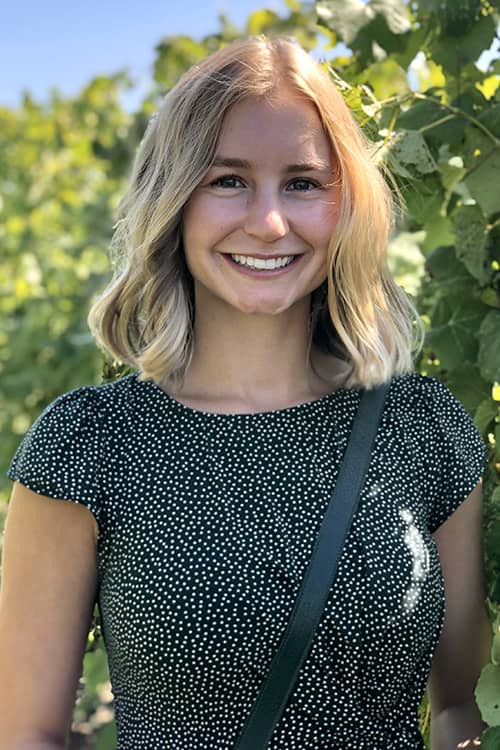
Emily Carroll, Undergraduate student, Chemistry
Develops new tools for diabetics
• Hometown: West Des Moines, Iowa
• Faculty mentor/advisor: Johna Leddy, Chemistry Professor
• What is your degree program and expected graduate date? Chemistry B.S. graduating May 2021
• Please describe your research: I research new methods in non-invasive glucose monitoring. I work with a graduate student in our lab, building a non-invasive blood glucose sensor with the goal of positively aiding the way people manage their diabetes and make it easier, less invasive, and cheaper to maintain baseline health. People with diabetes need to check their blood sugar and they should do it several times a day; the challenge is the current method for monitoring diabetic status is intrusive and involves pricking fingers or inserting a reusable senor with a tiny needle in the back of the arm or abdomen. Our lab is using electrochemistry to build a non-invasive sensor that would measure a person’s blood glucose levels immediately by sensing the ketones in the sweat; worn like a watch, the sensor would measure the sweat that forms on the inside wrist, a less intrusive and easier process than current systems allow.
• In simple terms, why does this research matter? This project has the potential to make a significant impact on people living with diabetes and how they manage their health. Currently, the amount of time and money poured into maintaining baseline health is inconvenient and expensive, and our sensor would decrease daily maintenance. Our sensor is different from those currently on the market or in testing in that it will be reusable for more than 2-week periods and will not need to penetrate the skin (as of now, patients can wear continuous glucose monitor sensors on their arm for 2 weeks before changing them; the basic monitors cost several hundred dollars and a month supply of sensors can cost over $150). I am passionate about helping people with diabetes because I have seen firsthand what effective equipment can do to positively aid people’s management of their health.
• How soon after starting at the University of Iowa were you able to participate in research? I started research spring semester of my sophomore year after being introduced to my research advisor in the chemistry class she was teaching, Analytical Chemistry I.
• How has being involved in research made you more successful at the University of Iowa? My involvement in undergraduate research has made me more successful at the University of Iowa because it has allowed me to take the material learned in my chemistry classes and apply it to real world problems, gaining critical thinking skills by connecting the two. I have found that application of my knowledge is the best way for me to learn, and that thinking about problems like diabetic health monitoring through the lens of chemistry has forced me to confront how well I know and can apply what I’ve learned in my courses. My research group pushes me to ask questions and stretch myself, connecting the dots between different types of chemistry and building critical thinking and problem-solving skills. Research is an opportunity to learn laboratory techniques and run experiments with the instruments as well as make connections and learn from graduate students and professors one-on-one, to be a part of the Hawkeye research community.
• What are your career goals and/or plans after graduation? I plan to continue studying chemistry in graduate school after graduating from the University of Iowa, pursuing research in the energy sector, specifically looking to solve problems related to energy storage and conversion.
Banner location: online—
